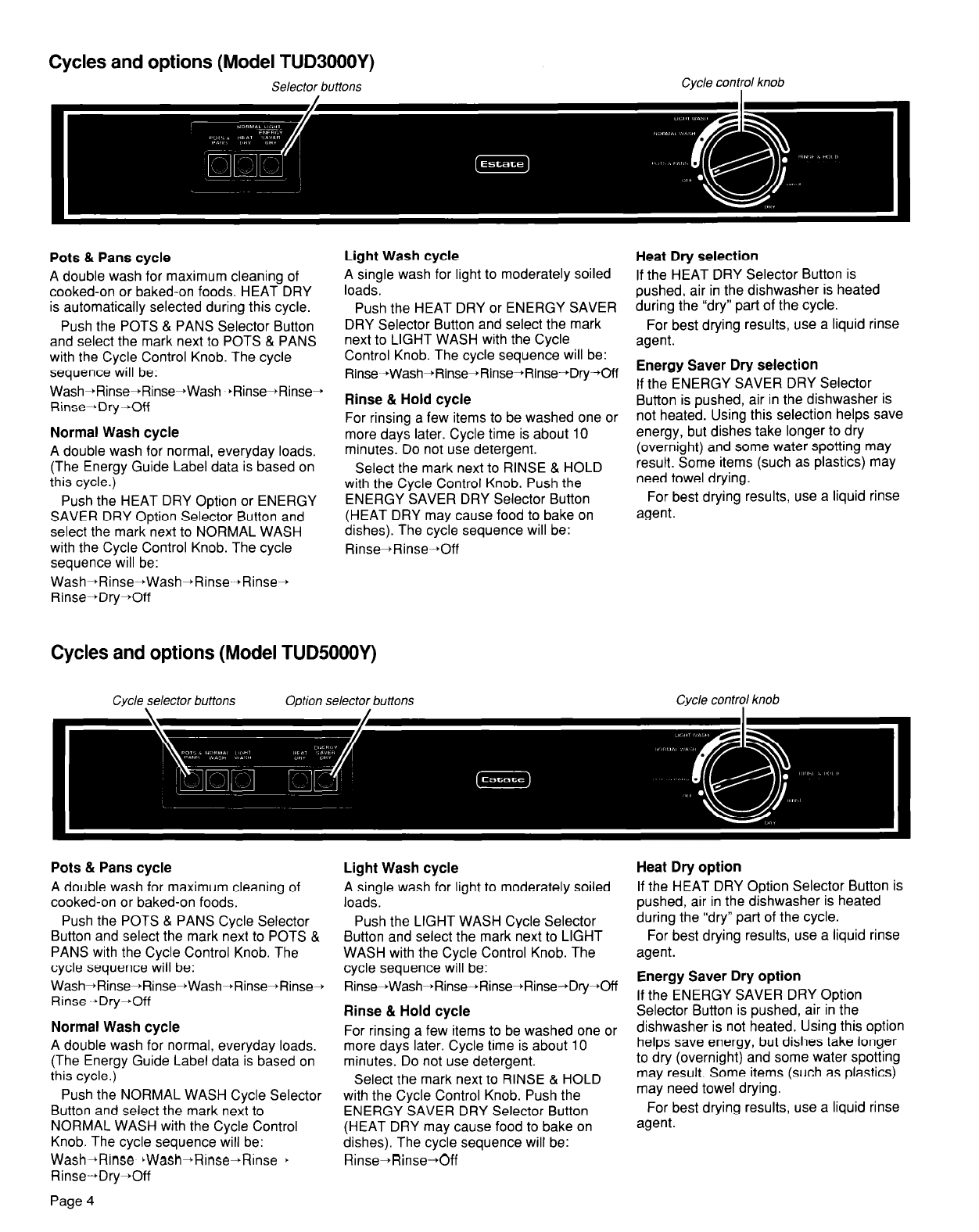
Cycles and options (Model TUD3000Y)
A double wash for maximum cleaning of
Pots 81 Pans cycle
cooked-on or baked-on foods. HEAT DRY
is automatically selected during this cycle.
Push the POTS & PANS Selector Button
and select the mark next to POTS & PANS
with the Cycle Control Knob. The cycle
sequence will be:
Wash-Rinse-Rinse-Wash +linse+Rinse-
Rinse-Dry~-Off
Normal Wash cycle
A double wash for normal, everyday loads.
(The Energy Guide Label data is based on
this cycle.)
Push the HEAT DRY Option or ENERGY
SAVER DRY Option Selector Button and
select the mark next to NORMAL WASH
with the Cycle Control Knob. The cycle
sequence will be:
Wash-Rinse-Wash+Rinse--+Rinse+
Rinse-Dry+Off
A single wash for light to moderately soiled
Light Wash cycle
loads.
Push the HEAT DRY or ENERGY SAVER
DRY Selector Button and select the mark
next to LIGHT WASH with the Cycle
Control Knob. The cycle sequence will be:
Rinse +Wash+Rinse-Rinse-Rinse+Dv+Off
Rinse i? Hold cycle
For rinsing a few items to be washed one or
more days later. Cycle time is about IO
minutes. Do not use detergent.
Select the mark next to RINSE & HOLD
with the Cycle Control Knob. Push the
ENERGY SAVER DRY Selector Button
(HEAT DRY may cause food to bake on
dishes). The cycle sequence will be:
Rinse+Rinse~-Off
Cycles and options (Model TUD5000Y)
Cycle selector
buttons
Option selector b&tons
Heat Dry selection
If the HEAT DRY Selector Button is
pushed, air in the dishwasher is heated
during the “dry” part of the cycle.
For best drying results, use a liquid rinse
agent.
Energy Saver Dry selection
If the ENERGY SAVER DRY Selector
Button is pushed, air in the dishwasher is
not heated. Using this selection helps save
energy, but dishes take longer to dry
(overnight) and some water spotting may
result. Some items (such as plastics) may
need towel drying.
For best drying results, use a liquid rinse
agent.
Cycle control knob
I
Pots & Pans cycle
A double wash for maximum cleaning of
cooked-on or baked-on foods.
Push the POTS & PANS Cycle Selector
Button and select the mark next to POTS &
PANS with the Cycle Control Knob. The
cycle sequence will be:
Wash-Rinse-Rinse+Wash-Rinse-Rinse+
Rinse +Dry+Off
Normal Wash cycle
A double wash for normal, everyday loads.
(The Energy Guide Label data is based on
this cycle.)
Push the NORMAL WASH Cycle Selector
Button and select the mark next to
NORMAL WASH with the Cycle Control
Knob. The cycle sequence will be:
Wash ARinse &Wash-Rinse-Rinse +
Rinse-Dry+Off
Page 4
Light Wash cycle
A single wash for light to moderately soiled
loads.
Push the LIGHT WASH Cycle Selector
Button and select the mark next to LIGHT
WASH with the Cycle Control Knob. The
cycle sequence will be:
Rinse-Wash-Rinse-RinseARinse+Dry+Off
Rinse & Hold cycle
For rinsing a few items to be washed one or
more days later. Cycle time is about 10
minutes. Do not use detergent.
Select the mark next to RINSE & HOLD
with the Cycle Control Knob. Push the
ENERGY SAVER DRY Selector Button
(HEAT DRY may cause food to bake on
dishes). The cycle sequence will be:
Rinse+Rinse+Off
Heat Dry option
If the HEAT DRY Option Selector Button is
pushed, air in the dishwasher is heated
during the “dry” part of the cycle.
For best drying results, use a liquid rinse
agent.
Energy Saver Dry option
If the ENERGY SAVER DRY Option
Selector Button is pushed, air in the
dishwasher is not heated. Using this option
helps save energy, but dishes take longer
to dry (overnight) and some water spotting
may result. Some items (such as plastics)
may need towel drying.
For best drying results, use a liquid rinse
agent.
